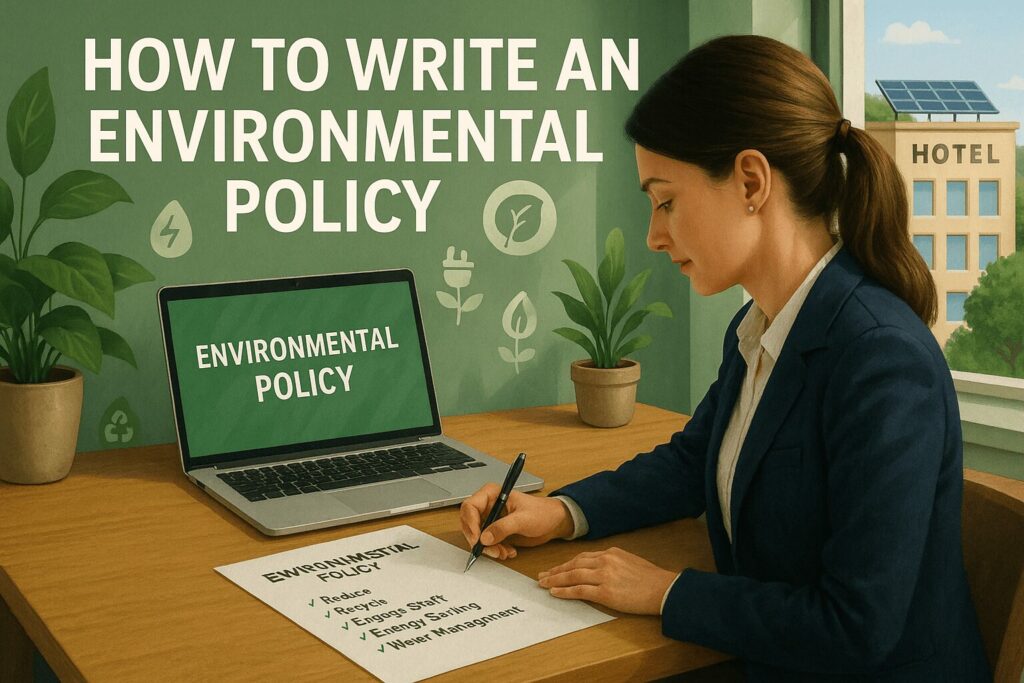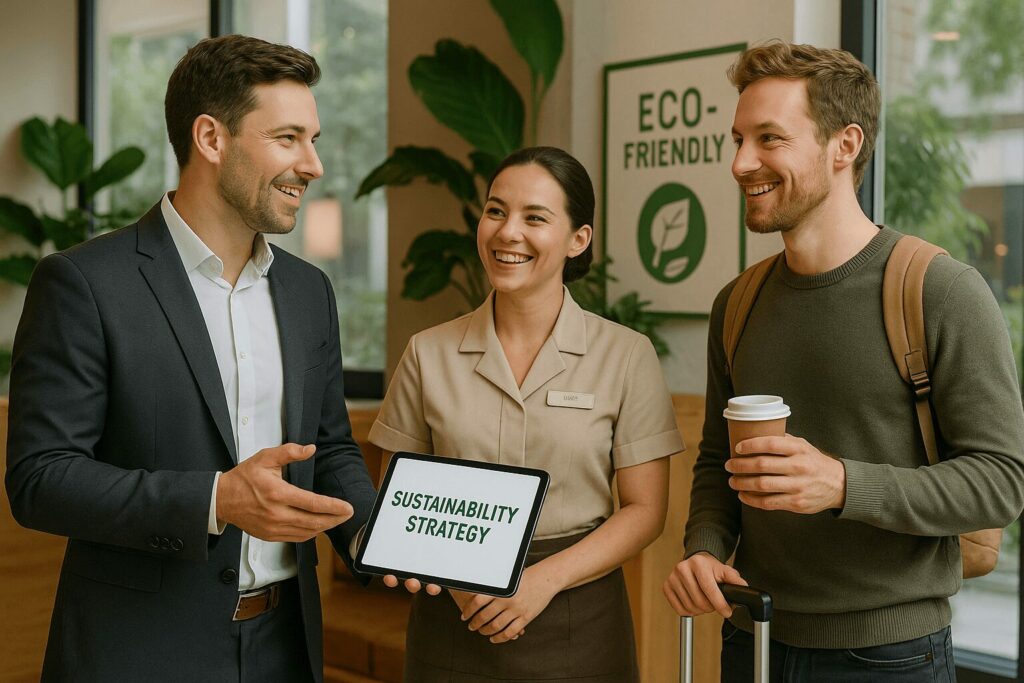
Actionable Tips to Create a Hotel Environmental Policy
Feeling overwhelmed by the pressure to create a hotel environmental policy that actually works? 🌿 You’re not alone. This guide cuts through the noise with actionable steps to craft green policies that align with sustainable hospitality practices, reduce your hotel environmental impact, and satisfy eco-conscious travelers—no greenwashing required. Let’s turn your green initiatives into a roadmap for hotel sustainability enhancement success.
Article Summary
A hotel sustainability policy make the bridge between the current situation in each department, the targeted improvement defined by the corporate and the method to reach the targets.
Every hotel department needs to have its own sustainability policy. It start from the assessment (the current practices and products used), set short-term and mid-term goals with figures according to the brand vision, and define how to reach these goals (staff trainings/investments/change products or suppliers etc).
Each sustainability policy should be composed of several sections:
- ESG: to align the policies and practices with the social vision of the corporate
- Training: to empower the employees and to train them to the new practices
- Energy efficiency: to raise the awareness of the team on the most efficient use of energy in the daily operations
- Water conservation: to provide guidelines to the team to save water in the daily operations
- Waste treatment: to reduce waste generation at the minimum
- Communication: how to highlight success and how to communicate them to the guests
- Purchasing: to encourage the department to source more and more eco-friendly products, while keeping the expected level of quality
Table of contents
- Mastering Environmental Policies for Your Hotel 🌿
- Creating an Effective Environmental Policy for Your Hotel 🌎
- Implementing and Communicating Your Environmental Policy 🌱
Mastering Environmental Policies for Your Hotel 🌿
Hotel environmental policy act as a strategic framework to minimize ecological footprints while aligning with sustainable practices. These policies address energy efficiency, waste reduction, and resource management across departments like housekeeping, maintenance, food services, procurement etc. By adopting guidelines such as ISO 14001 or Green Key, hotels meet guest expectations and regulatory demands. With 79% of travelers prioritizing eco-friendly stays, clear policies turn sustainability into a competitive edge without greenwashing.
- Define hotel environmental policy as a strategic commitment to sustainability
- Address multiple services (housekeeping, maintenance, F&B, logistics)
- Leverage existing guidelines like ISO 14001 or Green Key certifications
- Incorporate current trends like ESG criteria and carbon neutrality goals
These elements ensure policies align with global standards while driving measurable impact.
Environmental policies touch every corner of hotel operations. Housekeeping adopts eco-friendly cleaning products, while maintenance optimizes energy use. Restaurants source local ingredients, and logistics teams reduce transport emissions. Integrating these efforts into sustainable development plans involves tracking energy consumption, minimizing water usage, reduce waste generation and adopting circular economy principles. Policies also help hotels meet evolving traveler expectations, as 79% of guests now prioritize brands committed to reducing environmental impact. By aligning with frameworks like the Paris Agreement, hotels secure long-term resilience in a shifting industry landscape.
Creating an Effective Environmental Policy for Your Hotel 🌎
Getting Started with Policy Drafting
Start by auditing current operations to identify key environmental impact areas. Review energy and water consumption, waste generation, and supply chain practices. Engage department heads from housekeeping, F&B, and logistics to map and adapt existing procedures. Prioritize transparency over perfection—53% of guests appreciate honest sustainability efforts even if they’re not fully realized yet.
Set achievable goals that align with business performance. For example, aim to reduce energy consumption by a few percent every year. Connect sustainability targets to guest experience and cost reduction —eco-friendly practices can cut operational costs by up to 20%. Ensure targets address different departments’ unique needs while maintaining consistency across your hotel sustainability strategy.
Involve stakeholders from all levels early. Create cross-departmental working groups to ensure buy-in and train staff on sustainability basics while finalizing policies. Management commitment proves authenticity—hotels with executive support for green initiatives see 3x higher staff participation rates in sustainability programs.
Important Policy Sections and Content
Begin with a clear vision statement showing long-term sustainability commitment. Define measurable objectives and assign responsibility to specific departments. Include implementation timelines and reference relevant certifications like Green Globe or Biosphere. Build policies for all areas from procurement to guest engagement.
Address every matter through specific targets and by advising the method— »Reduce electricity use in guest rooms by 25% by 2027 using motion-sensor lighting. » For water conservation, include linen reuse programs and low-flow fixtures. Waste management sections should be adapted to each department and specify recycling percentages and composting requirements for kitchen operations. Ideally, each policy should contain the following sections:
- ESG integration for aligning policies with governance and social responsibility
- Employees training to raise their awareness, to empower them and to detect new talents
- Energy efficiency systems to reduce consumption and operational costs 💡
- Water conservation strategies like smart irrigation or linen reuse programs 🌊
- Zero-waste initiatives and circular economy principles ♻️
- Guest-centric communication to build trust and participation 🌱
- Responsible purchasing deployment to improve the products quality and create more communication channels with the guests
Establish quantifiable benchmarks like « achieve 80% waste diversion in F&B operations within 3 years » and implement monitoring through monthly sustainability reports tracking actual figures against targets. Review progress quarterly to maintain accountability—hotels that track metrics weekly see 40% faster improvement in sustainability performance.
Reach us if you need help to create your hotel sustainability policy and to integrate it into your existing policies?
Implementing and Communicating Your Environmental Policy 🌱

Staff Training and Engagement
Training starts with mandatory sustainability programs across departments. Since 2022, eco-efficient practices (energy/water management, waste reduction) became part of hotel rankings. Target 30,000 training hours over three years—30% of staff already follow environmental standards. Tailor sessions for housekeeping (eco-cleaning), kitchen (food waste reduction), and logistics (low-emission transport). Practical workshops beat lectures—tech teams learn energy optimization, front desk staff explain policies to guests.
Culture shifts happen when staff see themselves as eco-champions. Partner with local organizations for shoreline cleanups or tree-planting days. Ibis France’s ISO 14001 certification shows leadership—guests notice when 70% of ecolabels grew this year. Celebrate small wins: track departmental progress on energy water consumption reductions. Green Key-certified hotels report 40% higher staff retention—people stay when they feel part of meaningful change.
Recognize efforts through rewards. Offer gifts or meal vouchers to top performers. Public shoutouts work too—highlight “Sustainability Star of the Month” on staff boards. With 82% of travelers choosing eco-hotels, staff engagement improves guest experience. Make it personal: show how daily actions reduce environmental impact across 250-500 liters of water used daily per room.
Guest Communication and Engagement
Transparency beats hype. Share quantified metrics—display your hotel’s carbon footprint per night (e.g., 5kg CO2). Avoid vague claims like “eco-friendly”—use certifications like European Ecolabel. When guests see real data, 73% prefer eco-stays. Keep messaging simple: “By skipping daily linen changes, you save 50 liters of water per stay.”
Create incentives that stick. IHG’s “Greener Choices” program offers loyalty points for eco-actions—guests love tangible rewards. Offer discounts for no-daily-cleaning opt-ins or free plant-based meals. Frame participation as a win-win: travelers reduce their footprint while hotels cut costs by 0.5-2€ per night. Showcase local partnerships—guests love knowing 10% of bookings fund nearby reforestation projects.
| Touchpoint | Effective Messaging | Tools |
|---|---|---|
| In-room guides | “Your choices matter: Refillable toiletries save 1,000 plastic bottles/month” | Digital tablets, printed cards |
| Booking platform | “Offset carbon emissions for €1.50 when booking” | Carbon calculators, eco-filter |
| Check-in | “Join our zero-waste challenge—earn a free spa credit” | QR codes for sustainability dashboards |
| On-property signage | “Our kitchen composts 200kg of food waste/month—help us reach 500kg!” | Interactive kiosks, chalkboards |
Feedback loops keep policies relevant. Use post-stay surveys asking direct questions: “Which sustainability initiatives impressed you? What should we add?” 79% of travelers want actionable ways to engage—turn suggestions into new programs. Share results publicly: “Last month’s top guest idea—installing solar-powered phone chargers—launches next week!” This builds trust while proving your policy evolves with guest input.
